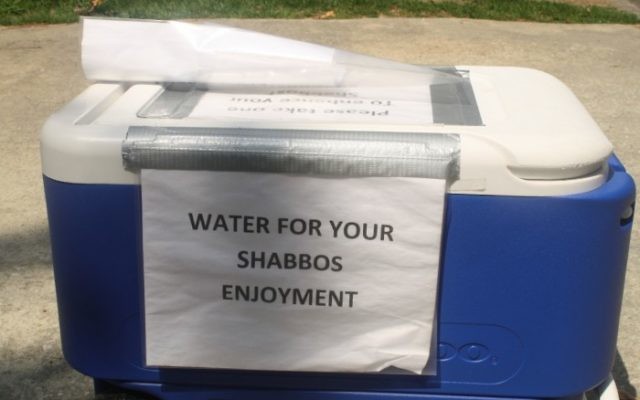Water Carriers Refresh Toco Hills Walkers
By R.M. Grossblatt
Many families in East European shtetls depended on water carriers — laborers who carried heavy buckets balanced on wooden yokes on their shoulders. Their work was essential not only for their livelihood, but for the families who depended on the water for drinking, cooking and bathing.
We have running water in most homes in America today, but in the heat of Atlanta, those walking back from synagogues in Toco Hills benefit from a new version of the water carriers — one inspired by a Sukkot experience in Jerusalem.
Every Shabbat morning on Bramble Road, before walking to shul, a man carries bottles of water to the curb and deposits them in an ice chest near one sign that reads, “Shabbat Shalom,” and another that reads, “For Your Shabbos Enjoyment.”
He has been doing so for four or five years and shrugs off the expense and the effort. Last winter, the water carrier provided warm soup.
When summer temperatures rise into the 90s, Shabbat observers in the community aren’t interested in soup. They often need cool drinks, however, and they find them in the middle of the block on Bramble.
Children often urge their parents to walk that way home from services. Some of them knock at the door of the neighbor to thank him for the drinks.
“It’s a good lesson for the children in kiras ha’tov (showing appreciation),” said the Bramble Road water carrier, who appreciates his nephew Rabbi Shlomo Pinkus, who started it all.
Around 2 a.m. one Sukkot in Jerusalem, Rabbi Pinkus, then a young yeshiva student, and his friends were walking home from the Kotel (Western Wall). Tired and thirsty, they spotted a sukkah in Mea Shearim with a sign on the door welcoming guests to sit down, make a bracha (blessing) and have a drink.
They walked inside the sukkah, where water poured out from a spigot connected to the owner’s house. There were even fruity flavors to add.
As Rabbi Pinkus cooled down and relaxed in the beautifully decorated booth, he hoped that in the future he would get the chance to offer drinks to others.
Years later, as a married man with a family in Atlanta, Rabbi Pinkus grabbed that chance. One Shabbat morning, looking out the window from his house on Biltmore Drive, he saw a white-haired man walking by his house who suddenly leaned on his mailbox. Rabbi Pinkus ran down the hill with a drink of water for the man, who thanked him, then walked home.
The next Shabbat, the same man leaned on the mailbox, and again Rabbi Pinkus offered him a drink. This time, after thanking the rabbi for the water, the man in his 80s asked, “Do you have a seat for me?”
So Rabbi Pinkus pulled over an outdoor chair, and the next week he left the chair in the shade under a tree. He thought that if one person needed a drink and a place to rest, maybe others did also. He knew that in Temple times in Jerusalem, the judges stood by the entrance to the city to offer water to those traveling to celebrate the festivals.
That message, plus the memory of the hospitality of the sukkah from his youth, led the rabbi to take action.
He wrote a message similar to the sign on the sukkah in Jerusalem, offering cold water bottles from a cooler and setting up a chair nearby. When temperatures were at their hottest, he left the cooler out during the week and wrote another sign for the mail carrier and garbage collectors to help themselves.
But always the rabbi refilled the cooler with a fresh supply of water bottles for Shabbat.
His idea caught on, and another family on the other side of Biltmore, the Sasoons, also put out water bottles and a chair to rest for Shabbat.
The Pinkuses and the Sasoons have made aliyah, but the Shabbat Shalom sign that the Sasoons designed now greets walkers near the water carrier’s home on Bramble. This summer, the water carrier added lemonade (pink, at his wife’s suggestion). Now even more children (and adults) walk down Bramble Road. And the water carrier and his wife are tickled pink.




comments